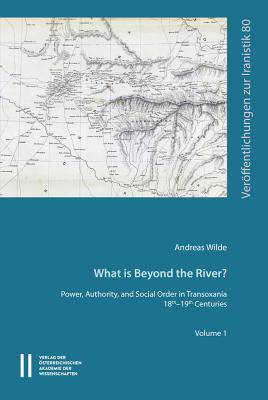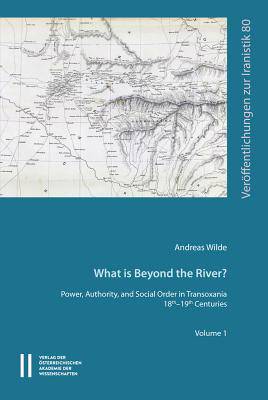
- Retrait en 2 heures
- Assortiment impressionnant
- Paiement sécurisé
- Toujours un magasin près de chez vous
- Retrait gratuit dans votre magasin Club
- 7.000.0000 titres dans notre catalogue
- Payer en toute sécurité
- Toujours un magasin près de chez vous
What Is Beyond the River?
Power, Authority, and Social Order in Transoxiania 18th-19th Centuries
Andreas Wilde
Livre broché | Anglais
223,95 €
+ 447 points
Description
This book investigates the dialectics of power and social order in eighteenth and nineteenth-century Ma Wara' al-Nahr from an intrinsic perspective. Relying on a rich corpus of Bukharan primary sources, the study is a work of fundamental research that combines established traditions of social historical research and approaches borrowed from the social sciences. The resulting narrative stretches from the Mongols and Abu'l-Khairids to the eighteenth century and the late Tuqay-Timurids, when the established spatial-administrative framework crumbled into an archipelago of petty Uzbek principalities, chiefdoms and "city states," continuing with the Manghits and finishing in the late nineteenth century with the colonial penetration. While beginning with a conventional bird's-eye view of steppe society worldviews and established patterns of authority, the author soon abandons the sole dynastic focus and comes up with a range of local histories. The reader will be acquainted with places like Nur, Shahr-i Sabz, Tirmidh, Hisar and other areas, which, having been dominated by competing military, religious and economic networks, remained partly outside the sphere of Tuqay-Timurid and later on Manghit authority. A large part of the book addresses the language employed in the chronicles by highlighting the semantics of key terms such as favor, loyalty or obedience. Those concepts are manifest in practices like patronage, mediation and gift exchange. Based on the materials of the Koshbegi Archive, the final part culminates in a range of micro-level studies of various socio-political domains in faraway villages and canal systems. Inspired by relational ideas of power, the analysis enhances our understanding of the factors that were decisive for social interaction in that period. Moreover, it gives fresh impulses to the debate on concepts of power and authority among historians and social scientists.
Spécifications
Parties prenantes
- Auteur(s) :
- Editeur:
Contenu
- Nombre de pages :
- 1101
- Langue:
- Anglais
Caractéristiques
- EAN:
- 9783700178668
- Date de parution :
- 10-08-16
- Format:
- Livre broché
- Format numérique:
- Trade paperback (VS)
- Dimensions :
- 152 mm x 234 mm
- Poids :
- 1896 g

Seulement chez Librairie Club
+ 447 points sur votre carte client de Librairie Club
Les avis
Nous publions uniquement les avis qui respectent les conditions requises. Consultez nos conditions pour les avis.







